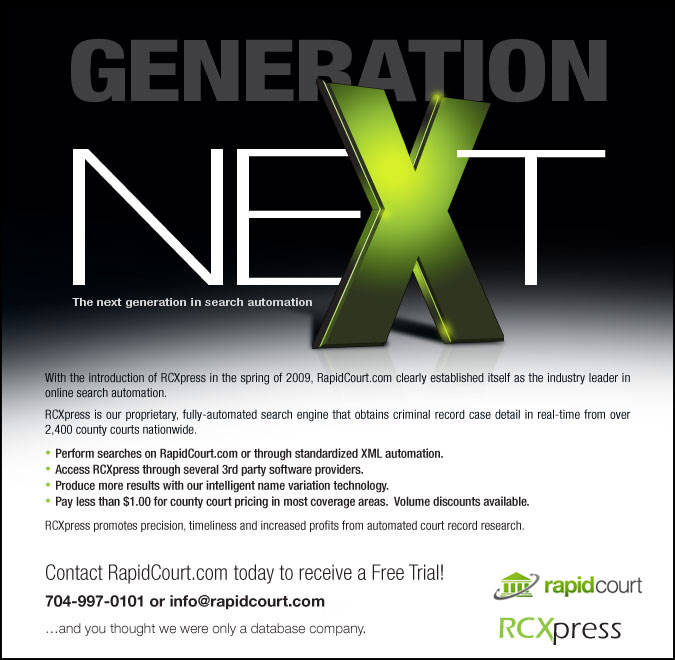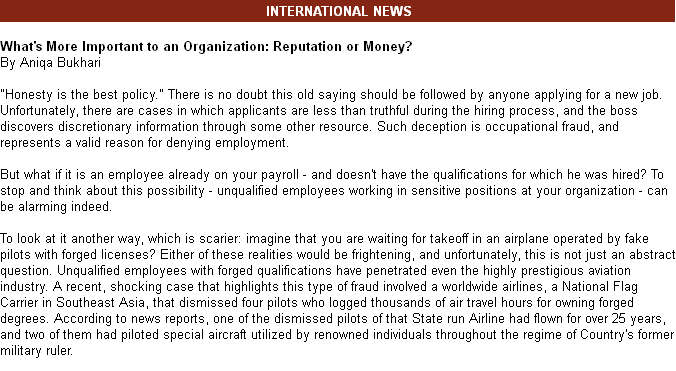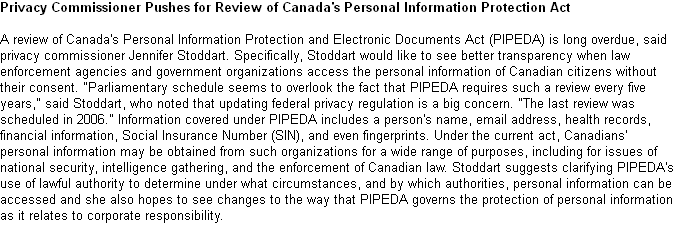| BACKGROUND
SCREENING NEWS |
Risky
Business People: Study Finds 1 in 8 Workers Bring Potential
Peril to Their Company
Organizations
need to recognize the advantages and disadvantages of behavioral
risk of all employees. Doing so allows an organization to manage
risk in a constructive way, according to a study published by
SHL, an Atlanta-based talent management company. The study claims
1 in 8 managers and professionals globally represent a high
risk to their companies. The risk comes from lower-quality decision-making
and poorer communication. Moving up the corporate ladder shows
a decrease in risk level: 1 in 15 executives pose a high risk
for their companies. Conversely, 1 in 7 lower-level employees,
such as team leaders and individual contributors, provide the
highest potential for risky behavior. Finally, 1 in 8 frontline
staff represent a high risk to their companies because of counterproductive
behaviors, such as lower compliance and attention to detail,
less of a commitment to a company and reluctance to working
with a team. These counterproductive behaviors can lead to more
errors in the workplace or damage a brand's name through poor
customer service. SHL recommends businesses commit to enforcing
ethical standards and developing effective channels for employees
to comfortably communicate ethical infractions to their superiors.
Read more

Gov.'s
Proposal Would Charge $10 for Court Records Search
In a move that is raising concern about limiting access to public
documents, California courts could charge $10 for each record
search under a proposal included in Gov. Jerry Brown's budget.
The governor included the search fee as one of the ways the
courts can raise $30 million a year to offset budget cuts. The
judicial budget has been reduced by more than $1 billion through
cuts and transfers over the past five fiscal years, which has
resulted in fewer courtrooms, construction delays and an array
of higher fees. Media organizations and good-government advocates
worry that such a fee would restrict access to files the public
has a right to view. Democratic lawmakers also expressed distaste
for restricting information to those who can afford it. Currently,
there is no charge to search a court file, although courts charge
$15 to look up cases that require a court employee to take more
than 10 minutes to search. Under the governor's proposal, a
person could search for free for a case in which that person
is a party but would be charged $10 for each additional search.
Lawmakers are holding off on the proposal until the governor
updates his budget in May.
Read more

Bill
to Remove Unfair Housing Practices Clears Senate
A bill, Senate Bill 5568, the Fair Tenant Screening Act Part
2, to ensure victims of domestic violence have fair and equal
access to housing passed the Senate on Monday night. "Being
a victim of domestic violence is a trauma I couldn't imagine.
There's no reason why someone should have to have that horrible
incident brought up again while looking for a home. This bill
prevents that from happening."
Read
more

Facial
Recognition System Nets 2,500 Identify Fraud Arrests
New York
state officials reported that the DMV's use of facial recognition
software for driver's licenses since 2010 has resulted in more
than 2,500 arrests of those trying to steal someone else's identity
or trying to get a second license. "Through this program, we
are successfully taking dangerous drivers off our roads, helping
to track down criminals, and protecting taxpayer dollars - sending
a clear message that New York State does not tolerate identity
fraud and those who try will be caught," Gov. Andrew Cuomo said
in a statement.
The DMV started using its facial recognition software to help
identify persons who may have had their license suspended, but
are trying to get another license, or who are trying to steal
another person's identity. The system uses software algorithms
to compare new photos taken at the DMV with existing photos
in the agency's database. If there's an inexplicable match,
then an investigation by "trained staff" ensues.
The sci-fi-like enhancement to the licensing process is not
hailed by all. Watchdogs fear the license photo database being
shared with law enforcement and other agencies.
Felony arrests that resulted from facial recognition included
more than 100 people who had "active felony warrants" under
one driver's license name, but set up a new state ID under an
alternate name.
Read more

New
Social Media Privacy Law Taken Up by Congress
The social
media privacy debate continues to rage - and now Congress has
taken up the reins. Rep. Elliot Engel, D-N.Y., has introduced
H.R. 537, the "Social Networking Online Protection Act." Engel's
bill would make it illegal for employers to ask job applicants
and employees for passwords to access their social networking
sites and email accounts. If passed, it will address the concerns
of 21 states that have similar legislation pending, and provide
a national legal standard that has already been adopted in California,
Delaware, Illinois, Maryland, Michigan, and New Jersey. While
a national standard on this issue would be a positive step toward
protecting individual privacy, it will not change an employer's
ability to see what is shared publicly. Employers who still
want to use social media as a background screening tool shouldn't
ask for passwords and shouldn't believe everything they see
online. They should, however, make sure to put a well-trained
individual who is knowledgeable about potential legal claims
in charge of reviewing and vetting the information and consider
FCRA implications.
Read more



| DATA
PROTECTION & PRIVACY |
Expected
FTC Chair Ramirez Could Push for Global Privacy Rules
Federal
Trade Commissioner Edith Ramirez, recently designated by the
Obama administration as the next chair of the Federal Trade
Commission, is expected to champion globalized approaches to
consumer privacy protection and to clamp down on fraudulent
marketing aimed at Spanish-speaking communities. The fact that
the Obama administration chose a woman comes as no surprise,
considering criticism of the president's male-centric senior
advisory staff. Ramirez has a background steeped in antitrust
and competition issues, and served as director of Latino outreach
for the Obama 2008 campaign. Jeffrey Chester of the Center for
Digital Democracy said, "Under (Ramirez's) leadership, we expect
the FTC to blaze a new ground on privacy." Ramirez has expressed
interest in leadership on APEC's cross-border privacy rules
and the intersection between privacy and technology. She has
also indicated support of robust rules around children's data
collection and raising the profile of the agency's work on behalf
of all minority and underserved communities.
Read more

Prepare for the Coming of the Privacy Police
The Federal
Trade Commission (FTC) is employing its authority to regulate
deceptive and unfair practices to go after companies that impinge
on consumer privacy. The agency is also finding new ways to
apply old laws to current practices. As the amount of online
data about consumers multiplies, so does the number and sophistication
of attackers trying to get it. And the issue becomes critical
as the attacks target corporate intellectual property and the
nation's infrastructure. "Paying attention to cybersecurity
is a business imperative," said Christopher Wolf, a Hogan Lovells
partner. "There are repeated attacks on infrastructure, and
businesses need to protect their trade secrets and preserve
the ability to operate their business. There are also privacy
issues if personal data is affected. I expect to see more attention
by Congress and the SEC [Securities and Exchange Commission]
to corporate disclosures on cybersecurity." Although there is
a lot of interest in consumer privacy on Capitol Hill, rifts
between and within the parties stand in the way of Congressional
action.
Read more

Top
3 Laws That Affect Drug Testing In Texas
Drug
Testing Cheating Law - A person is guilty of a misdemeanor
if he or she knowingly or purposefully manufactures, delivers,
owns, uses, or possesses a substance or device designed to falsify
a drug test (Ch. 481, Sub. 1, Part 133).
Workers'
Comp Denial Law - An insurance carrier is not required
to provide compensation for an injury that occurred while the
employee was in a state of intoxication (§406.032). §406.013
provides a definition of intoxication and explains that a positive
result from a blood test or urinalysis creates a rebuttable
presumption that a person is intoxicated and does not have the
normal use of mental or physical faculties. This does not necessarily
mean employers are required to use a blood or urine test when
contesting workers' comp claims.
Unemployment
Comp Denial Law - A TWC precedent case (No. 97-003744-10-040997)
sets out clear guidelines for employers responding to an employee's
unemployment compensation claim. To establish that a claimant's
positive drug test result constitutes misconduct, an employer
must provide five things: a policy prohibiting a positive drug
test result, evidence that the claimant has consented to be
tested under the policy, documentation to prove chain of custody
of claimant's sample was maintained, documentation to establish
GC/MS confirmation was performed after the initial test, and
documentation of test results in relation to a stated test threshold.
Source:
http://www.statedrugtestinglaws.com/

Court
Rules Random Alcohol Tests Do Not Violate ADA
A district
court has ruled that random tests for alcohol performed on probationary
employees who work in safety-sensitive positions do not violate
the Americans with Disabilities Act (ADA). The decision in EEOC
v. United States Steel Corp., marks the first time that any
court has addressed this issue and could serve as a reference
point for employers accused of discrimination through their
use of medical examinations. The court agreed with U.S. Steel's
argument that the random testing program is job related and
consistent with business necessity because it allows the company
to detect alcohol impairment on the job, which is a workplace
hazard. "Employers can view the U.S. Steel decision as a very
important affirmation of their right to take reasonable steps
to ensure a safe workplace," said Robin Shea, a partner at employment
law firm Constangy, Brooks & Smith. While the court's decision
should provide a measure of relief to employers in heavy industry,
Shea advises that until the case is resolved on appeal, employers
should continue complying with the EEOC's guidance.
Read more

Vermont
Marijuana Legalization Bill Filed
Vermont
has become the latest state to see a marijuana legalization
bill filed this year. House
Bill 499, "An Act Relating to Regulation and Taxation of
Marijuana," was introduced to the House and assigned to the
House Judiciary Committee on Tuesday.
It would
allow people 21 and over to possess up to two ounces of marijuana
and grow up to three plants. The bill also legalizes the possession
of pot paraphernalia. It would also "create a regulatory structure
for the wholesale and retail sale of marijuana that includes
licensing and oversight by the Department of Liquor Control."
People who possess more than two ounces or three plants or who
sell marijuana outside regulated commercial channels would still
be subject to criminal penalties.
Read
more

| Welcome
to the U.S. Legal Challenge Question! |
Sponsored By:


As the background
screening industry continues to get more competitive the firms
that will ultimately succeed will be those that create competitive
advantage through their people by offering continuous learning
opportunities to heightened their knowledge and capabilities.
We believe that having employees that are very knowledgeable about
the legal landscape of background screening is essential to continued
success.
We are grateful
to Pam Devata, Seyfarth Shaw
LLP for providing the expertise for this valuable endeavor.
For information regarding the answers to the Legal Challenge Questions,
please contact Pamela Devata at Seyfarth Shaw LLP at pdevata@seyfarth.com
or 312-460-5000 or visit www.seyfarth.com.
Please choose
your answer by clicking on it:

Proposed
"Ban the Box" Bill Would Greatly Restrict Use of Applicants' Criminal
Background Information by New Jersey Employers
On February
7, 2013, "The Opportunity to Compete Act" was introduced in the
New Jersey Senate, seeking to dramatically curtail the ability
of New Jersey employers to obtain or use a job applicant's criminal
history during the hiring process. The proposed bill would require
employers to engage in a multi-step process before rejecting an
applicant based on a criminal record. Unfortunately, the process
proposed in the Act lacks clarity as currently drafted. Under
the Act, most employers would be prohibited from inquiring about
an applicant's criminal history during the application process,
either directly or via a background check, until after a conditional
job offer is made. Once a conditional job offer is made, an employer
would be permitted to inquire about the applicant's criminal history
only after providing a detailed notification form, obtaining written
consent from the applicant, and then providing the applicant with
a standardized Notice of Rights form. Employers would then be
permitted to consider only those specific types of convictions
or pending charges expressly identified within the Act, and would
be precluded from considering non-pending arrests, or erased,
expunged, pardoned, or juvenile convictions. Employers who violate
the bill may be subject to civil penalties.
Read more

OFCCP Issues Guidance on Use of Criminal Records in Employment
Decisions
The U.S.
Department of Labor's Office of Federal Contract Compliance Programs
(OFCCP) has posted a Directive on "Complying with Nondiscrimination
Provisions: Criminal Record Restrictions and Discrimination Based
on Race and National Origin." The Directive incorporates guidance
issued on the same subject by the EEOC. The OFCCP Directive and
the EEOC Enforcement Guidance emphasize the racial and ethnic
disparities reflected in incarceration rates and advise contractors
to proceed with caution when relying on job applicants' criminal
records for employment decisions. The OFCCP warns that policies
and procedures that categorically exclude individuals based on
criminal records and do not take into account the nature and age
of an offense may violate federal antidiscrimination laws such
as Title VII. The agency clarifies that this is because an automatic
bar to hiring those with a criminal record will likely result
in an adverse impact on certain racial or ethnic groups. If an
employer's exclusion policy creates adverse impact on a protected
class, it will need to prove that it is job-related and consistent
with business necessity.
Read more

Utah Passes Internet Employment Privacy Act
The controversy
over employers requesting or requiring employees or applicants
to disclose their usernames or passwords for their online accounts
at services like Facebook and Twitter, has led some states to
pass laws restricting employers' rights to make such requests.
On March 7, 2013, the Utah State Legislature joined these states
and passed the Internet Employment Privacy Act (the Act). Under
the Act, Utah employers may not request that an employee or job
applicant disclose a username and password allowing access to
a personal Internet account. It also prohibits employers from
taking an adverse employment action (like refusing to hire, demoting
or firing) against an employee who fails or refuses to disclose
a username or password for a personal Internet account. A "personal
internet account" is defined under the Act as an online account
used by the employee or applicant for purely personal reasons
unrelated to work. The Act provides a private right of action
for any person aggrieved by such an action, but limits any potential
award to $500. Even with this limited exposure, the Utah Internet
Employment Privacy Act requires that employers proceed with caution
when accessing or requesting access to employee information on
the Internet.
Read more

Limits
on the Use of Credit Reports for Employment Screening
Democratic
Representative Steve Cohen from Tennessee, has introduced H.R.
645 in the House of Representatives. The legislation would
amend the Fair Credit Reporting Act (FCRA) to prohibit employers
from using credit reports in the hiring process as well as prohibit
the use of credit reports for the purpose of making adverse employment
decisions. The only exceptions to this would be for jobs which
require a security clearance, are with state or local government,
or for certain individuals working in the financial industry (i.e.,
supervisory, managerial, professional, or executive positions).
If this legislation
passes, it means employers would not be able to consider one's
credit history as part of a background check by a background screening
company for lawyers, cashiers, pharmacists, NBA referees, executives
in non-financial institutions, jewelers, academic financial aid
offices, Human Resources employees, procurement employees and
so on.
Montserrat
C. Miller, NAPBS Washington counsel suggest that you check out
the bill and see if your representative is a co-sponsor of the
bill as so far the legislation has 29 co-sponsors. The bill, the
Equal Employment for All Act is pending in the House Financial
Services Committee. You can contact your member of Congress to
share your concerns about the legislation by calling the Capitol
Hill switchboard at 202-224-3121 and asking to be directed to
your members office.
Read more
You can download
a copy of the
Equal Employment for All Act H.R. 645

Bill
Proposes Fingerprinting
Oklahoma
schools could increase school safety and security by expanding
the use of fingerprint background checks of adults who regularly
interact with students, according to one state lawmaker.
House Bill
2228, by state Rep. Joe Dorman, would allow schools to authorize
fingerprint background checks on anyone interacting with students
in school-sponsored activities, including volunteers. Currently,
schools cannot conduct these checks unless specifically authorized
by state law. The legislation was approved by the House Public
Safety Committee and now advances to the House Calendar Committee.
Read
more

Connecticut
Proposes Legislation Concerning Employee Passwords
The Connecticut
General Assembly's Labor and Public Employees Committee is drafting
Bill No. 159, titled "An Act Concerning Employee Privacy," which
would "prevent current or potential employers from requesting
or requiring that employees or potential employees provide passwords
to their personal accounts as a condition of their employment."
Read
more



Accurate
Background Announces Bilingual Global Platform
Accurate
Background, a technology leader in the background screening industry,
has announced a bilingual, online candidate entry technology to
support global clients with the need to collect information from
job applicants in other languages to conduct background checks.
Following consecutive years of extensive global growth, Accurate
Background continues to expand their services worldwide to improve
the job candidate experience while supporting diverse language
and compliance requirements in each country.
Accurate Background's French Canadian offering on their Global
Portal is part of an ongoing international translation project
which leverages rule-based protocols to intelligently look at
a job candidate's address and automatically identify potential
language options for translation. Job candidates can then select
the language of their choice directly through the intuitive, web-based
technology to translate the online application including data
entry fields, compliance forms, and email communication used during
the background screening process.
Read
more

deverus
joins Oracle Partner Network and accelerates customer integrations
 deverus, Inc., the leading provider
of mission-critical workflow solutions to the background check
industry, announced that it is the first independent technology
vendor to the industry to join the Oracle Partner Network (OPN).
The new partnership will allow deverus to integrate its online
solutions with Oracle-based customer applications more quickly
and more reliably than ever before. deverus, Inc., the leading provider
of mission-critical workflow solutions to the background check
industry, announced that it is the first independent technology
vendor to the industry to join the Oracle Partner Network (OPN).
The new partnership will allow deverus to integrate its online
solutions with Oracle-based customer applications more quickly
and more reliably than ever before.
"We are pleased
to take this important step with Oracle," said Shane Long, CEO
of deverus. "Our Hubworks integration engine already cuts substantial
time and cost from the integration process, but our new partnership
with Oracle will allow us to improve even further; first, by working
with Oracle to identify customer-specific integration issues well
in advance; second, by improving the time-to-completion of our
integration projects; and third, by improving the quality of the
integrations that we deliver to our customers. Oracle-based employers
and background check companies can have full confidence that Oracle
will be an active and involved partner when they decide to integrate
their systems with deverus."
As a new
OPN member, deverus now enjoys a broad range of benefits unavailable
to other independent technology vendors to the background check
industry. These benefits include enhanced access to Oracle support
documentation, technical personnel, and account managers, allowing
Deverus to invoke Oracle's customer knowledge and domain expertise
with greater ease at any point in the integration process.
More information
about deverus is available via its website at www.deverus.com

HireRight
Expands Global Background Screening Service Offerings in 181 Countries
HireRight
, a leader in on-demand employment background checks, drug and
health screening and electronic Form I-9 and E-Verify solutions,
announced it has added nine new products available in up to 181
countries to its global screening services portfolio. HireRight
continues to expand its global platform by introducing new country
services that reinforce its global reach and local touch.
"With today's
war for talent, employers need every competitive advantage to
hire the best candidates, regardless of where they have lived
or worked, and get them onboard quickly," said Mike Petrullo,
president and CEO for HireRight. "Continuing to invest in and
expand upon our market-leading international screening capabilities
lets our customers broaden their talent search globally, while
still making informed hiring decisions with an international talent
pool."
 Read more Read more

First
Advantage and Findly Create New Entity
First Advantage
and Findly announced they have completed a transaction to create
a separate new entity that brings together the First Advantage
ATS, Assessment and Recruiting Solutions businesses with Findly
under the Findly brand.
The talent
marketplace is being buffeted by major changes brought about by
disruptive mobile, social and data offerings. Findly is at the
nexus of these changes, and together with the scale provided by
the First Advantage businesses, Findly will drive market-leading
innovation that benefits you and the entire market.
Find
out about Findly and our new product platform >

InfoMart has successfully proven compliance with the background
screening industry's strictest professional standards achieving
accreditation with the National Association of Professional Background
Screeners (NAPBS). For more information about InfoMart, please
visit www.infomart-usa.com
or call (770) 984-2727.

i9
Advantage Introduces Remote9
to Help Employers Deal with Remote Hiring Challenge
As remote hires continue to increase, companies are faced with
finding a way to comply with Form I-9 rules – completing
within the one-day/three-day rule, and ensuring a company representative
views original documents, with the employee present.
The number of employees who telecommute continues to increase,
according to TeleworkResearchNetwork.com. As companies hire talent
from across the country, they are finding a new compliance challenge
cropping up – ensuring the Form I-9 is completed within
the one-day/three-day rule.
“Due to the needs of organizations to have
employees based across the United States, companies are no longer
bound by geography when hiring,” says Aaron Bernstine, i9
Advantage Director of Business Development. “As a result,
we’re seeing these businesses struggle to maintain compliance
by having the Form I-9 completed within the time frame provided
by the government.”
Those companies
who are not compliant could face harsh penalties if audited by
U.S. Immigration and Customs Enforcement (ICE.)
Read
more

| ALCOHOL
AND DRUG TESTING - continued |
New
York Medical Marijuana Bills Introduced
New York has become the latest state to see medical marijuana
legislation introduced this year. On Tuesday, Assemblyman Richard
Gottfried filed Assembly Bill 6357 and Senator Diane Savino filed
companion legislation, Senate Bill 4406. The bills would create
a tightly regulated system of medical marijuana supply, complete
with patient registries, but would not allow patients or designated
caregivers to grow their own medicine. Patients would be limited
to possessing no more than 2.5 ounces.
Drug reform
and marijuana advocacy groups welcomed the introduction of the
bills, but some expressed concerns that the measures as written
do not provide enough protection for patients.
"Patients
and their families in New York have suffered far too long because
New York continues its retrograde approach to marijuana policies,
even as other states move forward with more sensible approaches,"
said Julie Netherland, deputy director of New York policy for
the Drug Policy Alliance.
Read
more

Oral
fluid finding more positives; Marijuana remains most commonly
detected
Drug Testing
Index (DTI) data released by Quest Diagnostics, provider of diagnostic
information services, reveal a jump in positivity rates for marijuana
in oral fluid vs. urine in the U.S. general workforce. While marijuana
positivity rates in oral fluid and urine changed little between
2008 and 2011, the gap between oral fluid and urine positivity
rates for marijuana increased during this time from a 29% higher
positivity rate in oral fluid in 2008 to a 42% higher positivity
rate in 2011. Due in part to advances in oral fluid testing technology
implemented in late 2011, the oral fluid marijuana positivity
rate was 70% higher than that of urine (3.4% vs. 2.0%) in the
first half of 2012 as compared with 2011.
Read more

Maryland
Medical Marijuana Bill Passes House
The Maryland House of Delegates Monday approved House Bill 1101
that would allow academic medical centers to provide medical marijuana
to patients whose doctors recommend it. The bill would set up
a medical marijuana commission to which the centers could apply
for permission to administer marijuana to patients within a research-focused
program. Marijuana would be grown either by state-licensed growers
or by the federal government.
Sponsored by Del. Dan Morhaim (D-Baltimore), the
bill would require the academic medical centers to specify qualifying
medical conditions for treatment; treatment duration and dosage;
where marijuana would be obtained; sources of funding; and a plan
for monitoring data and outcomes, among other things.
Read
more

Bureau
of Labor Statistics: Employment Rose in February
Seasonally
adjusted employment data released by the U.S. Bureau of Labor
Statistics indicates that overall U.S. nonfarm payroll employment
increased by 236,000 jobs in February. The job gains far exceeded
many economists’ predictions that put payroll additions
for February at around 175,000 new jobs.
The jobs report was much stronger than expected and unemployment
has reached a four-year low. Employment growth was mostly driven
by new job creation in professional and business services (+73,000),
construction (+48,000), health care (+32,000), retail trade (+24,000),
and information (+20,000). Employment in other major industries
showed little change over the month.
The overall U.S. unemployment rate edged down from 7.9% in January
to 7.7% in February.
Read
More

Public
Record Update
Sponsored by:

Public
Record Update
By Mike Sankey, PRRN
| BRB's
FREE RESOURCE CENTER |
For the MOST COMPREHENSIVE RESOURCE describing
all access methods, restrictions, fees, and search procedures
on over 26,000 government and private agencies visit the Public
Record Research System (PRRS-Web) . We provide the extensive details
and in-depth data you will not find doing a Google search!
For more information
contact Michael Sankey at mike@brbpublications.com
or visit www.brbpublications.com/updates.aspx
Pending
Changes to ACD Codes
The AAMVA
Code Dictionary (ACD) is a key component to driving records. The
ACD Codes reflect provisions in federal regulations dealing with
commercial drivers. The states use the codes to identify the type
or reason for a conviction and the reason for a driver withdrawal
such as a suspension, revocation or withdrawal when communicating
with the Commercial Driver's License Information System (CDLIS)
or with the Problem Driver Pointer Systems (PDPS). Many states
have adopted these three-character codes in their own proprietary
conviction code tables, especially when indicating out-of-state
convictions.
The American
Association of Motor Vehicle Administrators ( AAMVA ) is the copyrighted owner
of the ACD. AAMVA recently released a new version - ACD Release
5.0.0 - which is scheduled to take effect on September 1, 2013.
There are additions, deletions, and revisions of codes.
An overview
of these changes appears at www.mvrdecoder.com . Click on the
"About ACD Codes."

More
States Enacting the 2010 Amendments to UCC Article 9
Over the
past several years, states' filing offices have been busy gaining
legislative approval for implementing the amendments to Article
9 (Secured Transactions) of the Uniform Commercial Code. The changes
are to go into affect July 1, 2013. Approx. 80% of the states
have passed laws to date.
On March
20, 2013, Montana's governor signed HB212 to enact the 2010 amendments
to Article 9. Legislation in Mississippi (SB2609) and New Mexico
(SB146) have also recently been passed and bills been sent to
their governors for signature.
The transition
to the 2010 Amendments means many states will need to change their
UCC Forms. An excellent array of sample new forms is provided
by the Texas Secretary of State at www.sos.state.tx.us/ucc/new-forms-alert.shtml
.

| EMPLOYMENT
OUTLOOK - continued |
SHRM
Leading Indicators of National Employment® (LINE®)
|
In March, the hiring rate will drop slightly in manufacturing
and increase sharply in services compared with a year
ago |
Manufacturing
|
Services
|
| -1.4
|
+17.4
|
Source:
March 2013 SHRM LINE Report

One in four
American adults has some type of criminal record (meaning an arrest
or a conviction), according to the Justice Department and the National Employment Law Project
.
Source: Airport Screening Concerns Civil Liberties
Groups , By SUSAN STELLIN, Published: March 11, 2013




|
 |
|
The
People Factor in Security
Assuming
that the physical environment, data and network have been
secured, the weakest link in most security plans is the
people who are involved in the business processes. In
our industry, we spend large amounts of time and money
to verify that the reported data is for the correct applicant
or consumer. How much effort is taken to ensure that only
the right people can access this information? If there
is a breakdown in validating the identity of the people
who provide, review, deliver, or receive the information,
then the rest of the security measures were wasted.
For
this reason, all system security begins with authentication,
the process of determining whether the person is who they
claim to be. The key to authentication is balancing the
level of certainty that we need about the person's claimed
identity with the level of inconvenience that they are
willing to accept. In other words, the more onerous the
requirements are to prove their identity, the harder the
system will be for them to use it and the less likely
they will be to continue using it.
Multi-factor
authentication (MFA) is an approach that depends on more
than one factor to validate a user's claim of identity.
MFA uses a combination of something a user knows, like
a password or PIN, with something the user has, like a
smart card or ATM card, and/or something the user is,
like a fingerprint or biometric characteristic. By authenticating
the username (claim to identity) with a strong password
(something they know) and a rotating security code from
a smart card (something they have), the system can recognize
the user with a higher level of certainty than a username
and password combination alone would provide. The more
factors that are required, the greater the certainty will
be while the usability of the system will decrease. The
key is finding the sweet spot in each implementation that
will ensure the user's identity while remaining easy to
use.
Read
the full article

|
|
Ken Dawson CIO/CISO
ClearStar
Company Statement:
ClearStar provides technology and wholesale services to
some of the most progressive background screening companies
in the industry. With our shared source code applicant
portal, background screening companies can have more control
of the client experience. We are celebrating our 17th
year of serving the screening industry this April
For
More Information:
KenD@ClearStar.net
770-416-1900 main
678-807-2637 fax
www.clearstar.net
|

 Kevin Coy is a Partner in the Washington
DC office of Arnall Golden Gregory LLP. Kevin
advises background screening companies and other clients on a
wide range of privacy and consumer regulatory issues, including
Fair Credit Reporting Act, Gramm Leach Bliley Act, Drivers' Privacy
Protection Act, and Dodd Frank Act compliance issues, as well
as data breach matters. Kevin also represents clients with matters
before the Federal Trade Commission, the Consumer Financial Protection
Bureau, and other consumer protection agencies. Kevin Coy is a Partner in the Washington
DC office of Arnall Golden Gregory LLP. Kevin
advises background screening companies and other clients on a
wide range of privacy and consumer regulatory issues, including
Fair Credit Reporting Act, Gramm Leach Bliley Act, Drivers' Privacy
Protection Act, and Dodd Frank Act compliance issues, as well
as data breach matters. Kevin also represents clients with matters
before the Federal Trade Commission, the Consumer Financial Protection
Bureau, and other consumer protection agencies.
Kevin can
be contacted at Kevin.Coy@agg.com
or 202-677-4034.
THE
WASHINGTON REPORT - March 2013
On Capitol
Hill, the current debates over background screening primarily
are focused on whether-and if so, to what extent-mandatory background
checks for gun purchasers should be expanded. Competing bills
have been introduced and congressional hearings have produced
fireworks, although it is still unclear what legislation, if any,
ultimately will pass.
Employment
background screening activity also is underway on the Hill, but
not receiving the same level of congressional attention as the
gun-control legislation. Rep. Steve Cohen (D-TN), for example,
has reintroduced his bill to prohibit the use of credit checks
for many employment purposes (H.R. 645 in the current Congress).
The bill has two dozen co-sponsors, although no hearing on the
bill has been scheduled and the bill is not expected to move through
the Republican-controlled House.
FTC
President Obama announced that he was elevating Commissioner
Edith Ramirez to replace Jon Leibowitz as Federal Trade Commission
(FTC) Chairman. It is believed she will have a keen interest on
FTC enforcement in the privacy space as an FTC priority.
FTC and
CFPB Coordination
Currently, the agencies believe that their Memorandum of
Understanding is working well for now and they have not observed
any inconsistencies arising from instances where companies have
sought informal guidance from the agencies.
Read
More

One
Site! Many Suppliers! |
Get Your Copy of the Suppliers
Buyers Guide
Looking
for the Top Suppliers in the Industry? Need to find a new Supplier?
Visit our VENDOR
SHOWCASE which features suppliers to the Background
Screening Industry.
Suppliers
to the Background Screening industry Guide Now Available!
Click
here or on image to get a copy

Contact
Barry Nixon at wbnixon@aol.com
for information on getting your firm listed in the


York University Says Ex-Official
Accused of Fraud Claimed a Bogus Degree
York University says it has discovered that a controversial executive
it fired in 2010 over fraud allegations misrepresented his academic
credentials when it hired him, the Toronto Star reported. The
Canadian institution is in the midst of a lawsuit accusing the
former official, Michael Markicevic, of leading a scheme involving
two dozen other parties that featured scores of fraudulent home-improvement
invoices. Mr. Markicevic has denied the lawsuit’s claims.
Mr. Markicevic submitted a résumé
for a management position at York that said he held an M.B.A.
degree from “Auburn State University,” the newspaper
reported. The university’s lawyers noted that no such institution
exists, and confronted him with correspondence from Auburn University
indicating that he neither attended nor received a degree from
the Alabama institution. However, when York announced his appointment,
in 2004, the institution said he had a degree from Auburn, according
to the newspaper.
Read
more

STOP
STRUGGLING WITH WRITING AND PUBLISHING YOUR NEWSLETTER: |

We can help
you have a high quality e-newsletter to help nurture your relationship
with your clients and attract new clients. Our customized newsletter
service will take over your newsletter task or create a new one
for you. We can manage the creation of your newsletter for you.
We are constantly
researching information to use for The Background Buzz and
you can put our research to use for you. Using the information
rich content from The Background Buzz (minus the ads
and competitors information) we will create a custom newsletter
for you.
Use your staff’s
time to do more valuable work and save all the hassle of researching
or writing articles, formatting and managing all the other ezine
tasks with our customized ezine process.
Contact Barry
Nixon at 949-770-5264 or at wbnixon@aol.com
for more information.

Navigating
the U.S. Employment-based Immigration System
ACIP and
SHRM released its 2013 primer, "Navigating the U.S. Employment-based
Immigration System," available online at
http://www.acip.com/2013-primer-flipbook . In it, you will
find information about how the U.S. economy can be strengthened
and American jobs created through reform of the employment-based
immigration system, including:
- Employment-based
green cards;
- H-1B and
L-1 visas;
- Electronic
employment verification / E-Verify;
- Processing
efficiencies / Trusted Employer;
- And more,
including how America measures up in the global competition
for top talent, a history of legislation and glossary of key
terms.
View
the primer here or request a hard copy from at 703-535-6466

Justice Department Reaches Settlement
with Centerplate Inc. to Resolve Immigration-Related Unfair Employment
Practices
The Justice Department announced that it reached an agreement
with Centerplate Inc., resolving allegations that the company
violated the anti-discrimination provision of the Immigration
and Nationality Act (INA). Centerplate, based in Spartanburg,
S.C., is one of the largest hospitality companies in the world.
With over 10,000 employees nationwide, Centerplate provides food
service to over 250 stadiums, convention centers and entertainment
venues across the country.
The Justice Department’s investigation concluded that, for
at least the past three years, Centerplate engaged in a pattern
or practice of treating work-eligible non-U.S. citizens differently
from U.S. citizens during the INA’s employment eligibility
verification processes, including E-Verify, by requiring specific
documents issued by the Department of Homeland Security from non-U.S.
citizens, while not making similar requests of U.S. citizens.
Under the terms of the agreement, Centerplate has agreed to pay
$250,000 in civil penalties, the third highest amount paid through
settlement since enactment of the INA’s anti-discrimination
provision in 1986. Centerplate has also agreed to fully compensate
any victims who lost wages as a result of Centerplate’s
practices, undergo Justice Department training on the anti-discrimination
provision of the INA, and be subject to monitoring of its employment
eligibility verification practices for a period of three years.
The case settled prior to the Justice Department filing a complaint
in this matter.
Read
more



Mandatory
E-Verify Central to Immigration Reform
Employer
representatives have testified before a congressional panel that
they support the expansion of the federal government's E-Verify
electronic employment verification system, which experts agree
will be a central piece of comprehensive immigration reform.
Emily Tulli, a policy attorney at the National Immigration
Law Center, testified that lawmakers should proceed with caution
on mandating an electronic verification system because of "E-Verify's
database error rates, lack of worker protections, lack of due
process, insufficient privacy protections and the significant
amount of employer misuse of the program." Opponents also urged
Congress to make sure that any compulsory federal E-Verify program
contains a robust safe harbor for employers so that those who
use the system in good faith will not be held liable by USCIS,
or by the employer's workers, for system errors. USCIS official
Soraya Correa, said that USCIS continues to improve E-Verify's
accuracy by increasing the number of databases that the system
checks, and expanding the use of the photographic-matching tool
to include U.S. passport photos. USCIS is also working on an E-verify
smartphone app, with the aim of providing an electronic and I-9
integrated version.
Read more

The Form I-9 Gets a Make-Over
With the
passage of the Immigration Reform and Control Act, since November
6, 1986, all employers throughout the U.S., small or large, have
been obliged to complete a form I-9 to record identity and work
authorization documents for every new hire. The government has
released six major editions of the I-9 form and on March 8, 2013
it released yet another version as well as a newly minted M-274,
Handbook for Employers, Guidance for Completing Form I-9. The
I-9 form has been reformatted and expanded and is now a two page
form. The instructions are now five pages and the List of Acceptable
Documents has changed slightly in format but not in content. The
new form may be used as of its effective date of March 8, 2013,
but employers have a grace period and may continue to use the
older form (08/07/09Y edition) until May 7, 2013. There is no
need to complete the new edition of the I-9 for current employees.
Recording the social security number is optional, but employers
who are registered with E-Verify must obtain the social security
number in order to conduct the e-verification, which must be done
within three days of hire. With the release of the new I-9, employers
should take the opportunity to purge I-9s where the employee is
no longer employed and the I-9 was retained for a minimum of three
years, including one year after the employee termed.
Read more

|


|

Read
more

Read more

Read
more


Read more

Canada
Adds 50,700 Jobs
Canada's
economy showed signs it may be ready to bust out of its half-year
funk by churning out a surprisingly strong 50,700 new jobs in
February, most of them full-time, in the private sector and in
Ontario. The outsized gain was enough to keep the unemployment
rate at the four year low of 7.0 per cent despite the fact over
60,000 Canadians joined the labour force in the month, another
good signal for the economy.
Regionally,
Ontario was the biggest generator of new jobs, adding 35,300,
followed by British Columbia with an increase of 19,800. Quebec
had the biggest drop in employment, shedding 13,100 jobs.
Finance Minister
Jim Flaherty cited the "good economic news" Friday after his meeting
with private sector economists, who gave him some bad news as
well - the economy won't grow as fast as was expected this year.
The February
employment data showed all of the growth was in the services side,
led by a 26,000 gain in the scientific and technical services
sector. There were also 21,000 additional workers in the accommodation
and food services, which may have been partly due to resumption
of NHL hockey in late January. Public administration and agriculture
also saw gains.
Read
more

Did
You Know?
Over the
past decade the number of temporary foreign workers in Canada
has tripled.
Source: http://www.theglobeandmail.com/news/politics/surge-in-foreign-workers-shows-challenge-for-job-training/article9973956/
China's Evolving Personal Data Privacy Landscape
The first ever national standard on personal data privacy
protection has come into force in China. The guidelines, called
the Information Security Technology - Guide for Personal Information
Protection within Public and Commercial Information Systems (Guidelines),
were originally proposed by the nation's telecoms regulator, the
Ministry of Industry and Information Technology in 2011 and subsequently
released by the Standardization Administration of China. The Guidelines
provide guidance on protecting personal information handled in
information systems and applies generally to the private sector.
While the Guidelines do not have the force of law, the introduction
of a general national standard on personal data privacy protection
marks a significant move for China. The China Software Evaluation
and Test Centre have announced it is forming a self-regulatory
group to play a consultative role in future legislation in the
personal data privacy arena. Organizations should take active
measures now to prepare their data collection, handling and processing/use
practices for compliance with the best practice Guidelines.
Read
more
Costa Rica Adopts Information Privacy Law
Costa Rica
now has its own laws on the storing, sharing, and access of personal
information. Under Law #8968 individuals must now provide their
express consent for the collection of their personal information
in databases, and individuals will have the right to revoke that
consent at any time.
The guidelines
include the "right to informational self-determination," which
is defined as the right of every individual to know what personal
information of theirs is collected in databases, and for what
purpose. The only exceptions are in cases where there is a court
order, or when a resolution is adopted by a special committee
of the Legislative Assembly.
Read
more
Firms Should 'Hit the Ground Running' for BCRs Under New EU Law
Companies
should start the process for Binding Corporate Rules (BCRs) now
so they will be ready for the new EU data protection regime, stated
Eduardo Ustaran, Partner at Field Fisher Waterhouse LLP. ''BCRs
should be the next big project for companies," said Ustaran. "The
real success of BCRs is that they can be tailored to the way a
company operates. BCRs are not just for multinationals; smaller
companies can also benefit.'' In particular, the proposed EU Data
Protection Regulation - put forward by the Commission in 2012
- recommends companies of all sizes adopt BCRs as a means of legitimizing
intra-group transfers out of Europe, and states that they should
be binding not only within companies but also with respect to
third parties. Amendments submitted in January 2013 by EU Parliamentary
Rapporteur Jan-Philipp Albrecht could add further obligations
including data minimisation, limited retention periods and privacy
by design. On the international front, the Asia Pacific Economic
Cooperation (APEC) is currently examining ways to harmonise its
Cross Border Privacy Rules to that of BCRs.
Read more
French Tax Proposal Zeroes in on Web Giants' Data Harvest
The New York
Times reports on the proposal to tax data collection with the
goal of promoting sound practices for gathering and protecting
information. French auditor Nicolas Colin, introduced the idea
based on European countries' frustrations with their inability
to collect tax revenue from Internet companies generating significant
income each year, especially as budget deficits loom. "Every government
needs revenues," Colin said, adding the individual taxpayer and
small companies carry the burden if large corporations do not.
Google and Facebook know that John Doe "likes" wine, is shopping
for a Volkswagen and often e-mails Jane Doe. The new idea would
require the companies to pay for gathering that information. While
business plans built on mining consumers' personal information
from the Internet are proliferating, so are concerns about the
use of the data. Colin's tax plan would reward companies for providing
their customers with useful information, while penalizing those
that did not do so. Although the government commissioned the report,
it is not an official policy document, and the finance ministry
has yet to take a position on the idea.
Read more
Firms To Hire More Staff In Q1 2013
According
to the latest Hudson report, Employment Trends Q1 2013, the majority
of firms (51.3%) there intend to keep staffing levels steady and
more than one-third of employers in Hong Kong (37%) plan to hire
more staff in the first quarter of this year.
However,
Hudson's general manager in Hong Kong, Tony Pownall, says the
local labour market has a shortage of highly-skilled workers.
"Many Chinese companies see (Hong Kong) as a fertile talent ground,
seeking to relocate people to offset their local talent shortages.
Employment is rising in order to meet higher business demands
and tightening job market capacity is continuing to push staffing
costs upwards," Pownall said.
Read
more
Recruitment Moving into Positive Direction
Hiring sentiments in India's formal sector was +9% higher in February
when compared to a year ago, with the pharma, IT and BPO sectors
posting increased activities. The latest job index by local job
board Naukri.com found that recruitment prospects are looking
brighter than in 2012. However, sectors like banking, oil and
gas, telecom and insurance saw dips in hiring levels, ranging
between -9% and -13%. The auto sector posted flat hiring levels
while capital goods (+9%), software services (+5%) and the pharma
(+2%) sector all posted growth in hiring levels. In February,
the highest demand was seen for professionals in HR, software
services and accounts domains. Sales and engineering design professionals
were also much sought after while demand for banking professionals
unsurprisingly dropped during the month. Barring Hyderabad which
saw stable hiring levels, hiring activity grew across major cities,
particularly in Pune and Kolkata, Delhi, Mumbai, Bangalore and
Chennai.
Read more
Protection of Children and Vulnerable Persons
- "Suite" of Legislation
Three legislative
acts with far reaching implications are being placed on employers
and organizations: The Criminal Justice (Withholding of Information
on Offences against Children and Vulnerable Persons) Act, 2012
(Withholding Act), The National Vetting Bureau (Children and Vulnerable
Persons) Act 2012 (Vetting Act), and Children First 2012 (Children
First). The key provision of the Withholding Act is the creation
of an offence of withholding information in relation to certain
arrestable offences committed against children and vulnerable
people. The intent is to introduce a form of mandatory reporting
by creating the threat of criminal sanctions for those withholding
information. The Vetting Act provides a legislative basis for
the vetting of persons who seek positions of employment relating
to children or vulnerable persons, making vetting mandatory. The
overarching policy objectives of Children First is raising awareness
of child abuse, recognizing and reporting child abuse, and the
management of child safety concerns for specified organizations.
The key provisions of the Bill, from an employer's perspective,
is to train and set standards for its staff and volunteers and
to appoint its most senior manager as a Designated Officer, to
ensure children in its care are protected through recording, monitoring
and reporting.
Read
more
White
Paper on Singapore Population
The White
Paper on Population was recently passed by Singapore's Parliament,
but the response to it has been far from positive. Aside from
the public outcry, the business community has also criticised
it for being heavy-handed in its foreign labour restrictions.
The biggest
issue of contention has to do with the government's tighter controls
on foreign labour. In a united move to oppose the paper, nine
foreign chambers of commerce have written an open letter to Acting
Minister Tan Chuan-Jin. "Our members are concerned with the revision
of government policies pertaining to the employment of foreign
workers in Singapore and the resultant impact on the operations
of foreign and local companies and the overall economy," the letter,
signed off by Australian Chamber of Commerce president Graham
Lee, stated.
It also warned
that further tightening of labour would result in many organisations
moving their operations overseas, and with that, many job opportunities
for Singaporeans. Local firms are likewise feeling the pinch.
Seah Kian Peng, MP for Marine Parade GRC and CEO of NTUC Fairprice,
says his organisation is feeling the manpower crunch. Some 10%
of its workers are foreigners.
Read more
Can I Really Find Out if I'm Employing a Criminal?
The Court
of Appeal has ruled that the blanket disclosure of all criminal
convictions and cautions may breach job applicants' human rights.
In giving judgment, it said that, while the criminal records checks
system and the disclosure obligations interfered with individuals'
rights to privacy, the interference might be justified where the
aim was a legitimate one, namely in order to protect employers
and vulnerable people. However, the Court said that unfiltered
disclosure of all convictions and cautions irrespective of their
relevance was disproportionate to those aims and so breached the
right to respect for private life. The Court did, however, say
that the requirement to disclose serious offences was proportionate.
This means that the Government may ultimately introduce a filtering
system, which would take into account the relevance of information
about an individual's criminal record to the job for which they
are applying. However, the Government has applied for permission
to appeal the judgment. On that basis, the Court has decided that
its decision will not take effect in the meantime.
Read
more

|
ADVERTISERS IN THIS EDITION |


|  |
|
|
| |
|
Background
Screening Jobs |
|
Visit
the Job Board for the Employment and Tenant Screening Industry.
Here you will find resumes of people with industry experience
and employers seeking applicants with experience in Employment
and Tenant Screening and related businesses.
www.backgroundscreeningjobs.com



|
UPCOMING CONFERENCES, COURSES & EVENTS |
Feature
Education:
 |
FCRA
Basic Certification Webinar Series Update
The
FCRA Basic Certification program series is now available
for purchase.
For
more information
|
2013
Events (
Click Here to View full list of Events )
- Updated Monthly
SHRM
State Conferences, visit
http://www.shrm.org/Conferences/StateAffilliateConferences/Pages/default.aspx
Drug
and Alcohol Testing Industry Association (DATIA), 2013 Training
Course Schedule, visit
http://datia.org
SAPAA
Training Institute Learning Events, http://www.sapaa.com/
CUPA-HR
Conferences: http://www.cupahr.org/
World
Federation of People Management Associations, Events,
http://www.wfpma.com/events/by-region#quicktabs-tab-view__events__page_3-4
|
 Ni sa yadra
(good morning in Fiji pronounced ni sah yan dra)
Ni sa yadra
(good morning in Fiji pronounced ni sah yan dra)










 Kevin Coy is a Partner in the Washington
DC office of Arnall Golden Gregory LLP. Kevin
advises background screening companies and other clients on a
wide range of privacy and consumer regulatory issues, including
Fair Credit Reporting Act, Gramm Leach Bliley Act, Drivers' Privacy
Protection Act, and Dodd Frank Act compliance issues, as well
as data breach matters. Kevin also represents clients with matters
before the Federal Trade Commission, the Consumer Financial Protection
Bureau, and other consumer protection agencies.
Kevin Coy is a Partner in the Washington
DC office of Arnall Golden Gregory LLP. Kevin
advises background screening companies and other clients on a
wide range of privacy and consumer regulatory issues, including
Fair Credit Reporting Act, Gramm Leach Bliley Act, Drivers' Privacy
Protection Act, and Dodd Frank Act compliance issues, as well
as data breach matters. Kevin also represents clients with matters
before the Federal Trade Commission, the Consumer Financial Protection
Bureau, and other consumer protection agencies. 












